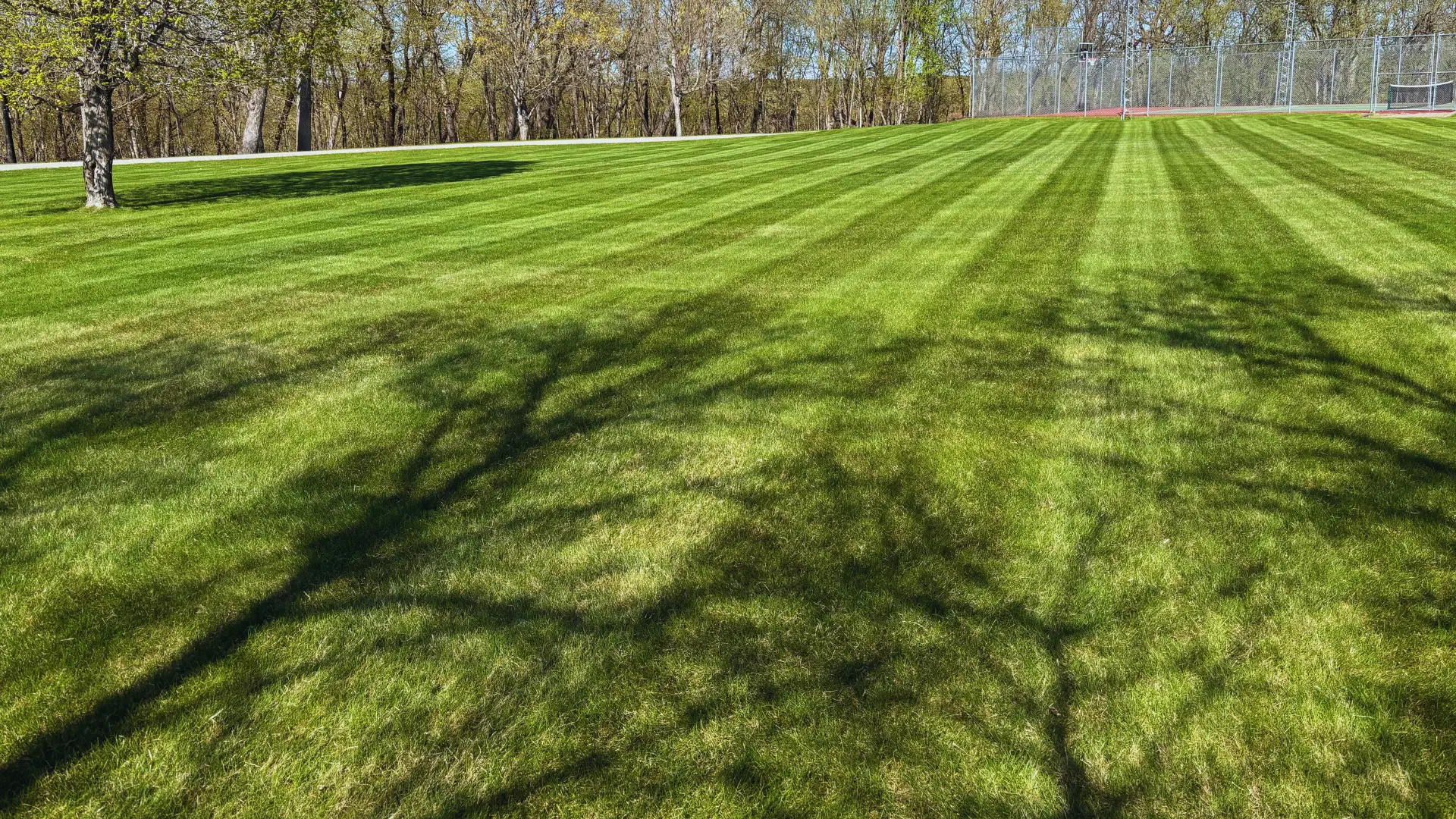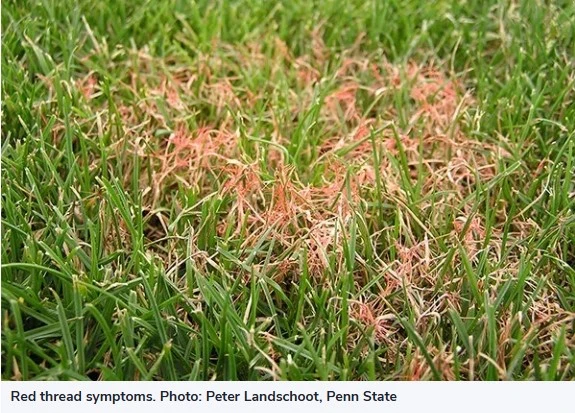
Winter is still in full swing here in Detroit Lakes, but we all know spring arrives fast. When the snow finally melts, it often leaves behind a yard that needs some serious attention.
At Miller Yard Care, our spring schedule fills up quickly. Getting on the list now ensures your yard is first in line for recovery when the weather breaks. Here is what our cleanup includes and how it helps your lawn.
Blowing Out Beds: We blow winter debris (leaves, twigs, trash) out of your rock and mulch beds.
Dethatching: We mechanically remove the layer of dead grass and thatch buried in your lawn. Here is more info on this at https://extension.sdstate.edu/understanding-thatch-turf
Vacuuming & Hauling: We vacuum up the debris—leaves, thatch, and sticks—and haul it away for a spotless finish.
Beyond just looking good, a cleanup provides three key benefits to help your lawn wake up from winter.
1. Helps Manage Snow Mold
After a long winter, you might see crusty gray or pink patches on the grass known as Snow Mold. This fungus thrives on wet, matted grass. Dethatching helps break up these matted areas, allowing air to reach the soil and helping the grass dry out and recover faster. For more info please see this site Iowa State University Extension: Snow...
Here in Detroit Lakes and across Becker County, the brilliant colors of autumn are a welcome sight. But as the leaves fall, they create a thick blanket across our lawns and gardens. While it might be tempting to let nature take its course, a proper fall cleanup is one of the most important services to prepare your lawn for winter.1
With our area's heavy leaf coverage, this seasonal task, often called lawn winterization, is about much more than just tidying up; it's a vital investment in your property's health.
Letting a thick layer of leaves sit all winter can cause serious problems that you'll be dealing with in the spring.2
It Smothers Your Grass: A dense, matted layer of wet leaves blocks essential sunlight.3 Your grass needs this sunlight in the fall to store energy for winter. When it's smothered, it can weaken, leading to thin patches and a difficult start come springtime.4
It Invites Lawn Diseases: The damp, dark environment under a blanket of leaves is the perfect breeding ground for fungal diseases.5 Effective snow mold prevention starts now with a thorough leaf cleanup.6
It Shelters Pests: That cozy layer of leaves provides the perfect winter home for insects, mice, and other pests that can damage your plants or even try to move into your home to escape the cold.
It Blocks Air and Water: A thick leaf mat forms an impenetrable barrier, stopping air, water, and...
As the crisp autumn air arrives here in Northwest Minnesota, it’s tempting to think the lawn care season is over. The frantic growth of summer slows, and many homeowners believe they can save a little by skipping that final lawn application.
However, at Miller Yard Care, we want to let you in on a professional secret. We don't think of the fall treatment as the "last" application of the year. We consider it the first, and most important, application for next year's lawn.
This single treatment is what truly sets the stage for success. Based on decades of research from experts at Purdue University, the University of Minnesota Extension, and other leading institutions, this application performs three critical jobs that guarantee a healthier lawn next spring.
While the top growth of your grass is slowing down, the roots are working overtime. Fall is when cool-season grasses are actively storing energy and developing their root systems for winter.
Promotes Root Growth and Energy Storage: The specialized, slow-release fertilizer we use is designed to be absorbed by the plant and stored as energy reserves in the root system. This is the single most important factor for winter survival and a quick spring green-up. Instead of forcing vulnerable top growth, we are building a stronger foundation underground.
Improves Turf Density: A key benefit of fall fertilization,...
Here in the Detroit Lakes area, our lawns have worked hard all summer. They’ve endured heat, heavy foot traffic from backyard barbecues, and maybe even some dry spells. As we head into the final weeks of summer, many homeowners think about giving their lawn a break until spring.
But what if you could do more than just help your lawn recover? What if you could fundamentally rebuild it?
At Miller Yard Care, we offer an elite lawn renovation service that goes beyond simple seeding. Our philosophy is simple: a great lawn isn't just grown on top of the ground, it's built from the soil up. By combining the proven power of compost, aeration, and elite seed with cutting-edge soil science, we transform the very foundation of your lawn.
The first step in our process is top dressing the entire lawn with a thin, quarter-inch layer of rich, organic compost. This isn't fertilizer; it's something much more important. Experts from premier agricultural universities across the Midwest, including Purdue University Extension, emphasize that the main benefit of compost is its remarkable ability to improve soil structure.
Purdue experts explain that adding compost:
Improves Soil Structure: It binds with heavy clay or loose sandy soil, creating a perfect crumbly texture.2 This increases soil aeration and improves water-holding capacity, creating a better environment for...
Here in the Detroit Lakes area, our lawns have worked hard all summer. They’ve endured heat, heavy foot traffic from backyard barbecues, and maybe even some dry spells. As we head into the final weeks of summer, many homeowners think about giving their lawn a break until spring.
But what if we told you that the single most important thing you can do for a lush, green lawn next year happens right now?
According to turfgrass experts at leading Midwest universities, late summer is the "golden window" for aeration and overseeding. It’s the professional’s secret to lawn renovation, and today we’ll explain why.
First, let's talk about the foundation. At Miller Yard Care, we use an advanced aeration process. Our specialized machine uses vibrating steel tines to create deep channels into the soil. This action fractures and loosens compacted ground without pulling messy plugs to the surface, allowing your lawn’s root system to breathe.
Your lawn's roots can get choked out by two things over the summer: soil compaction and thatch buildup. As the University of Minnesota Extension notes, aeration solves these problems by creating pathways for air, water, and nutrients to get deep into the root zone. This encourages deeper, stronger root growth and a more resilient lawn.
Overseeding is exactly what it sounds like:...
We all love the look and smell of a freshly mowed lawn. It’s the centerpiece of a beautiful landscape. But have you ever noticed that sometimes, a day or two after mowing, the tips of your grass turn a little brown or frayed?
Many people blame the weather or a lack of water, but the real culprit is often hiding in plain sight: a dull mower blade.
At Miller Yard Care, we believe that the quality of our cut is just as important as the quality of our equipment. It’s why we take an extra step that most others don’t. Today, we want to pull back the curtain and show you why the sharpness of our mower blades is the secret to a truly healthy, vibrant lawn.
To understand the importance of a sharp blade, turfgrass experts at leading universities like Purdue University and the University of Minnesota Extension use a simple analogy: imagine surgery. A surgeon uses a sharp scalpel to make a clean incision that heals quickly. A dull blade is like trying to do the same job with a butter knife—it tears, shreds, and causes excessive damage.
Your grass is a living organism, and the same principle applies.
A sharp blade slices cleanly through the grass leaf, creating a tiny wound that the plant can seal and heal quickly.
A dull blade rips and tears the grass, leaving a large, ragged wound.
This single...
Hello neighbors!
With the recent stretch of hot and humid weather, you might be noticing some unusual spots, colors, or textures showing up in your lawn. While it’s easy to blame insects or drought, you could be looking at a common turfgrass fungus.
Fungi are a natural part of any lawn's ecosystem, but under the right conditions—like the heat and humidity we’ve been experiencing—they can multiply and become visible, causing aesthetic damage or, in some cases, serious harm to your turf.
These fungi primarily affect the blades of the grass, not the crown or the roots. While they can look alarming, they rarely kill the grass and can often be managed with good cultural practices.
If you see irregular, pinkish-red patches on your lawn, you might have Red Thread. Upon closer inspection, you'll notice red, thread-like strands extending from the tips of the grass blades.

What it is: A foliar disease that is most common in the cool, wet weather of spring and fall.
Threat Level: Low. According to the University of Minnesota Extension, Red Thread is a cosmetic issue and does not harm the roots or crown of the plant. Lawns typically recover.
Key Cause: A primary cause is low nitrogen fertility. If your lawn is under-fertilized, it's more susceptible.
Treatment: The best control is proper fertilization. A balanced fertility program usually ...
Just complete the form below to get a pricing quote.
